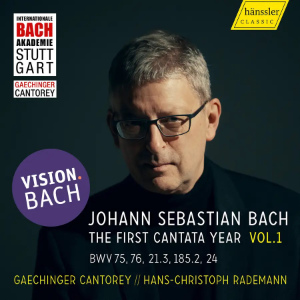
Johann Sebastian Bach (1685-1750)
The First Cantata Year Volume 1
Cantatas from 1st to 4th Sunday after Trinity
BWV 75 Die Elenden sollen essen
BWV 76 Die Himmel erzählen die Ehre Gottes
BWV 21.3 Ich hatte viel Bekümmernis
BWV 185.2 Barmherziges Herze der ewigen Liebe
BWV 24 Ein ungefärbt Gemüte
Gaechinger Cantorey/Hans-Christoph Rademann
rec. live, May 2023, Liederhalle Beethovensaal, Stuttgart (75, 76); June 2023, Liederhalle Mozartsaal, Stuttgart (21.3, 185.2, 24)
German texts and English translations included
Hänssler Classic HC23025 [2 CDs: 131]
So begins a planned 20 CD series from the VISION.BACH project, aimed at recording all 62 cantatas written in the first year of Bach’s tenure in Leipzig. The recordings are being taken from concerts around Stuttgart from May 2023 to June 2024 (the second volume has already been released). These are the first five he wrote following his appointment. This is a very significant undertaking by the performers, but even more so by the label, as the releases come up against a number of complete cycles (not organised in the same way admittedly), most notably those of Masaaki Suzuki and Bach Collegium Japan on BIS (reviews) and John Eliot Gardiner’s on Soli Dei Gloria with the Monteverdi Choir and English Baroque Soloists (reviews). It is likely that you will have your favourite; mine is the former.
In his earlier review, Michael Cookson has given some details of the performance practices and ensemble sizes (in brief, period and small), as well as considerable detail on the individual works. I shall restrict my comments to comparisons with the respective Suzuki recordings. Overall, these are very good performances, vibrant and full of the humanity that pervades these works. The playing of the instrumental ensemble is excellent, and recorded very well, especially considering they are taken from live performances (if there were any audience noises, I missed them). The style is more forthright than Suzuki’s, closer to that of Gardiner. Tempos are similar to Suzuki’s but seem a little faster because of the manner of playing.
Where the Suzuki performances win out for me (by a small margin) is in the choral singing. There is little difference in the size of the choirs – Rademann uses four voices to a part, Suzuki five – but the voices seem to blend better for Suzuki. There is a richness in their combined voices that is different to the more robust sound of the German choir. Mind you, in the spectacular final chorus in BWV21, Rademann’s forces outshine their Japanese counterparts. Rademann employs two different groups of STB soloists for the five works (Alex Potter is the ever-present alto), and while their contributions are generally very good, those in the Suzuki performances are again just a little superior. Yoshikazu Mera, Suzuki’s alto on BWV75, has an extraordinarily radiant voice, and Midori Suzuki is definitely more pure of tone than Rademann’s soprano, Natasha Schnur in BWV76. However, the other soprano used in the Hänssler set, Miriam Feuersinger, outshines her equivalent in BWV21.
If you are a collector of Bach cantatas, then on the basis of this first volume, this series looks like it will be a very fine addition to your collection. However, if like me, you already have a favourite set and don’t have the need or space for another, then good as these performances are, they probably aren’t going to supplant your existing recordings. It is a matter of fine margins though, and you would not be disappointed in the slightest if the Rademann set was your only version of these five works: it is certainly a very fine start to the series.
David Barker
Previous review: Michael Cookson (January 2024)
Buying this recording via a link below generates revenue for MWI, which helps the site remain free




















